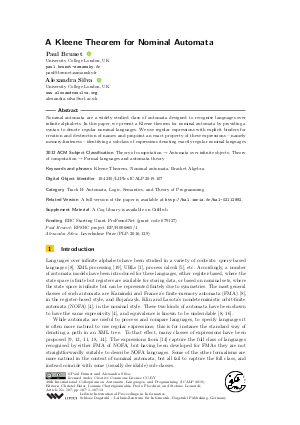A Kleene Theorem for Nominal Automata (Track B: Automata, Logic, Semantics, and Theory of Programming)
Authors
Paul Brunet  ,
Alexandra Silva
,
Alexandra Silva 
-
Part of:
Volume:
46th International Colloquium on Automata, Languages, and Programming (ICALP 2019)
Part of: Series: Leibniz International Proceedings in Informatics (LIPIcs)
Part of: Conference: International Colloquium on Automata, Languages, and Programming (ICALP) - License:
 Creative Commons Attribution 3.0 Unported license
Creative Commons Attribution 3.0 Unported license
- Publication Date: 2019-07-04
File

PDF
LIPIcs.ICALP.2019.107.pdf
- Filesize: 0.57 MB
- 13 pages
Document Identifiers
Related Versions
-
A full version of the paper is available at http://hal.inria.fr/hal-02112892.
Subject Classification
ACM Subject Classification
- Theory of computation → Automata over infinite objects
- Theory of computation → Formal languages and automata theory
Keywords
- Kleene Theorem
- Nominal automata
- Bracket Algebra
Metrics
- Access Statistics
-
Total Accesses (updated on a weekly basis)
0Document
0Metadata
Abstract
Nominal automata are a widely studied class of automata designed to recognise languages over infinite alphabets. In this paper, we present a Kleene theorem for nominal automata by providing a syntax to denote regular nominal languages. We use regular expressions with explicit binders for creation and destruction of names and pinpoint an exact property of these expressions - namely memory-finiteness - identifying a subclass of expressions denoting exactly regular nominal languages.
Cite As Get BibTex
Paul Brunet and Alexandra Silva. A Kleene Theorem for Nominal Automata (Track B: Automata, Logic, Semantics, and Theory of Programming). In 46th International Colloquium on Automata, Languages, and Programming (ICALP 2019). Leibniz International Proceedings in Informatics (LIPIcs), Volume 132, pp. 107:1-107:13, Schloss Dagstuhl – Leibniz-Zentrum für Informatik (2019)
https://doi.org/10.4230/LIPIcs.ICALP.2019.107
BibTex
@InProceedings{brunet_et_al:LIPIcs.ICALP.2019.107,
author = {Brunet, Paul and Silva, Alexandra},
title = {{A Kleene Theorem for Nominal Automata}},
booktitle = {46th International Colloquium on Automata, Languages, and Programming (ICALP 2019)},
pages = {107:1--107:13},
series = {Leibniz International Proceedings in Informatics (LIPIcs)},
ISBN = {978-3-95977-109-2},
ISSN = {1868-8969},
year = {2019},
volume = {132},
editor = {Baier, Christel and Chatzigiannakis, Ioannis and Flocchini, Paola and Leonardi, Stefano},
publisher = {Schloss Dagstuhl -- Leibniz-Zentrum f{\"u}r Informatik},
address = {Dagstuhl, Germany},
URL = {https://drops.dagstuhl.de/entities/document/10.4230/LIPIcs.ICALP.2019.107},
URN = {urn:nbn:de:0030-drops-106834},
doi = {10.4230/LIPIcs.ICALP.2019.107},
annote = {Keywords: Kleene Theorem, Nominal automata, Bracket Algebra}
}
Author Details
Funding
ERC Starting Grant ProFoundNet (grant code 679127)
- Brunet, Paul: EPSRC project EP/R006865/1
- Silva, Alexandra: Leverhulme Prize (PLP-2016-129)
Supplementary Materials
- A Coq library is available on https://github.com/monstrencage/BracketAlgebra.
References
- Michal Bielecki, Jan Hidders, Jan Paredaens, Jerzy Tyszkiewicz, and Jan Van den Bussche. Navigating with a Browser. In ICALP, pages 764-775, 2002. URL: http://dx.doi.org/10.1007/3-540-45465-9_65.
- Mikołaj Bojańczyk. Nominal Monoids. Theory of Computing Systems, 53(2):194-222, 2013. URL: http://dx.doi.org/10.1007/s00224-013-9464-1.
- Mikołaj Bojańczyk. Slightly Infinite Sets. A draft of a book, 2017. URL: https://www.mimuw.edu.pl/~bojan/paper/atom-book.
- Mikołaj Bojańczyk, Bartek Klin, and Sławomir Lasota. Automata theory in nominal sets. Logical Methods in Computer Science, 10(3):1-44, 2014. URL: http://dx.doi.org/10.2168/LMCS-10(3:4)2014.
- Benedikt Bollig, Peter Habermehl, Martin Leucker, and Benjamin Monmege. A Robust Class of Data Languages and an Application to Learning. Logical Methods in Computer Science, 10, 2014. URL: http://dx.doi.org/10.2168/LMCS-10(4:19)2014.
- Paul Brunet and Damien Pous. A Formal Exploration of Nominal Kleene Algebra. In MFCS, 2016. URL: http://dx.doi.org/10.4230/LIPIcs.MFCS.2016.22.
- Jamie Gabbay, Dan R. Ghica, and Daniela Petrişan. Leaving the Nest: Nominal Techniques for Variables with Interleaving Scopes. In CSL, volume 41, 2015. URL: http://dx.doi.org/10.4230/LIPIcs.CSL.2015.374.
- Michael Kaminski and Nissim Francez. Finite-memory automata. Theoretical Computer Science, 134(2):329-363, 1994. URL: http://dx.doi.org/10.1016/0304-3975(94)90242-9.
- Michael Kaminski and Tony Tan. Regular Expressions for Languages over Infinite Alphabets. In Computing and Combinatorics, 2004. URL: http://dx.doi.org/10.1007/978-3-540-27798-9_20.
- Dexter Kozen, Konstantinos Mamouras, and Alexandra Silva. Completeness and Incompleteness in Nominal Kleene Algebra. In RAMiCS, 2015. URL: http://dx.doi.org/10.1007/978-3-319-24704-5_4.
- Dexter Kozen, Konstantinos Mamouras, Alexandra Silva, and Daniela Petrişan. Nominal Kleene Coalgebra. In ICALP, volume 9135, pages 290-302, 2015. URL: http://dx.doi.org/10.1007/978-3-662-47666-6.
-
Alexander Kurz, Tomoyuki Suzuki, and Emilio Tuosto. A Characterisation of Languages on Infinite Alphabets with Nominal Regular Expressions. In TCS, pages 193-208, 2012.

-
Alexander Kurz, Tomoyuki Suzuki, and Emilio Tuosto. On Nominal Regular Languages with Binders. In FoSSaCS, pages 255-269, 2012.

- Leonid Libkin, Tony Tan, and Domagoj Vrgoč. Regular Expressions for Data Scientists. Journal of Computer and System Sciences, 81(7):1278-1287, 2015. URL: http://dx.doi.org/10.1016/j.jcss.2015.03.005.
- Andrzej S Murawski, Steven J Ramsay, and Nikos Tzevelekos. Polynomial-Time Equivalence Testing for Deterministic Fresh-Register Automata. In MFCS, 2018. URL: http://dx.doi.org/10.4230/LIPIcs.MFCS.2018.72.
- Frank Neven, Thomas Schwentick, and Victor Vianu. Finite state machines for strings over infinite alphabets. ACM Transactions on Computational Logic, 5(3):403-435, 2004. URL: http://dx.doi.org/10.1145/1013560.1013562.
-
Andrew M. Pitts. Nominal Sets: Names and Symmetry in Computer Science. Cambridge University Press, New York, NY, USA, 2013.

- Lutz Schröder, Dexter Kozen, Stefan Milius, and Thorsten Wißmann. Nominal Automata with Name Binding. In FoSSaCS, pages 124-142, 2017. URL: http://dx.doi.org/10.1007/978-3-662-54458-7_8.
- Thomas Schwentick. Automata for XML - A survey. Journal of Computer and System Sciences, 73(3):289-315, 2007. URL: http://dx.doi.org//10.1016/j.jcss.2006.10.003.
